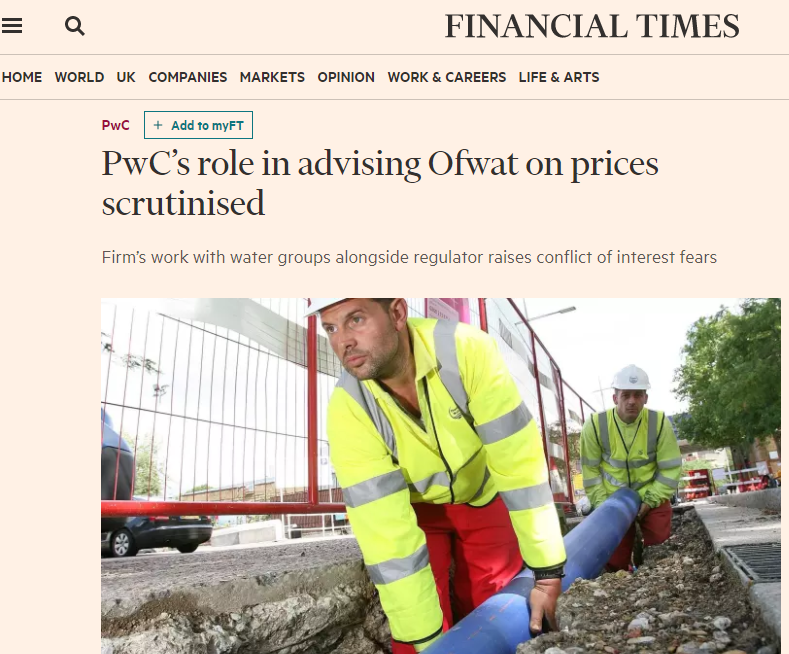
“The big-four accountancy firm PwC is facing criticism over potential conflicts of interest after advising Britain’s top water watchdog at the same time as several water and sewage companies.”
This story today in the Financial Times, about PwC’s conlicting roles in the UK water sector, can be seen as part of a very long-term trend in PwC’s development. It has prompted me to re-publish a piece I originally posted on my ‘Evidence-Based HR’ blog in 2011. It reveals just how deep-seated the decline in corporate values and misbehaviour have become and how many more ‘vampire squid’ have been spawned (see also ’10 years after the crash’). One wonders what the selection criteria are for PwC’s new, 2017 graduate intake?
From Evidence-based HR – posted on 7th July 2011
“PwC – The March of the clones
 Anyone who has ever seen the films Village of the Damned (based on the book The Midwich Cuckoos) or Stepford Wives, or any other work in the genre of people being turned into crazed automatons, and has also had the misfortune to work with PwC’s ‘HR consultants’, cannot fail to have noticed some very disturbing similarities. This might leave me open to charges of libel if it were not for the fact that the person who pointed this out to me was one of PwC’s own staff development managers (puts a whole new spin on the word ‘development’ doesn’t it?). To protect this person’s identity, and to save them from the sort of gruesome fate that usually befalls anyone who tries to halt the march of the clones, I will refer to this person as ‘A’. ‘A’ said that PwC had a reputation for producing clones (A’s words not mine), and very arrogant ones at that, and some of the partners were increasingly concerned about it apparently. At this point I felt a sudden urge to look over my shoulder and clock everyone else in the room for any suspicious behaviour such as talking into the cuffs of their sleeves.
Anyone who has ever seen the films Village of the Damned (based on the book The Midwich Cuckoos) or Stepford Wives, or any other work in the genre of people being turned into crazed automatons, and has also had the misfortune to work with PwC’s ‘HR consultants’, cannot fail to have noticed some very disturbing similarities. This might leave me open to charges of libel if it were not for the fact that the person who pointed this out to me was one of PwC’s own staff development managers (puts a whole new spin on the word ‘development’ doesn’t it?). To protect this person’s identity, and to save them from the sort of gruesome fate that usually befalls anyone who tries to halt the march of the clones, I will refer to this person as ‘A’. ‘A’ said that PwC had a reputation for producing clones (A’s words not mine), and very arrogant ones at that, and some of the partners were increasingly concerned about it apparently. At this point I felt a sudden urge to look over my shoulder and clock everyone else in the room for any suspicious behaviour such as talking into the cuffs of their sleeves.
Unfortunately, in the time since A told me this, PwC does not seem to have had any success in stemming its descent. I stumbled across an interview yesterday, about the totally discredited ex-HR head of RBS (Royal Bank of Scotland) that only confirmed my worst fears.
I first met Neil Roden in 2001 when he asked me to speak at RBS’s annual HR conference. At the time it was immediately apparent that he was a prime example of someone over-promoted by hanging onto the coat-tails of a mentor – CEO, Fred ‘The Shred’ Goodwin. Neil was already struggling to maintain a semblance of competence and composure in a job that was obviously too big for him. He was supposedly working on a strategy, or at least he seemed to have everyone at the conference working on the strategy, as they were invited into a room where the walls were covered with supposedly ‘strategic’ ideas. Neil appeared oblivious to the possibility that maybe strategy required leadership?
At the same time he was boasting about reducing the ratio of HR people per 100 FTE’s since RBS acquired Natwest. This obsession with irrelevant minutiae was partly due to him using Saratoga data – a specious benchmarking regime now run by PwC and still inflicted on many organisations – but also, as one of Fred Goodwin’s henchmen, he had to show his macho credentials by mimicking his master’s appetite for slashing costs. What had never occurred to Neil, or PwC/Saratoga, was that good HR people are not a cost but a sound investment. What a difference a few good HR people, who understand the true value of human capital, could have made to this now state-owned bank.
Worse still, Roden did not hide his ‘talents’ and ‘achievements’ as he won awards and was regularly chosen to top HR league tables. I even had my own clients asking me what was so good about RBS? Of course, I tried to put them straight and even challenged him head on but to no avail because one of the biggest myths in HR, that companies making lots of profits must be good at HR, is perpetuated by those very HR directors who work in profitable companies but have no evidence to demonstrate what their own contribution is (e.g. ‘She must be good – she worked for Pepsico’). The reality is then only revealed when the company crashes, like RBS or Enron.
So what is Roden’s view now?
“There’s a debate here about what HR can reasonably be held accountable for. People think HR runs companies. I say, stop getting carried away; HR is a support function, no more or less important than sales or IT. HR critics are way ahead of themselves; they need to get back inside their box.”
Roden is of course referring to ‘critics’ like yours truly but what Neil always failed to realise was that we were never criticising HR, per se, only its worst exponents. We were right all along as Roden himself now admits that HR at RBS was never strategic – it was just support. Of course, he is only saying that now to save his own skin – otherwise known as the Nuremberg Defence.
This makes Roden a prime candidate to join PwC. As Michael Rendell, head of HR services at PwC commented on the appointment:
“In addition to a wide ranging role advising clients on all aspects of HR, Neil will be focusing on the role of the HR function, how to optimise its activity and the critical impact of people on business performance.”
Obviously Rendell and PwC are not really bothered what Roden did at RBS and the fact they are already contradicting each other will soon be resolved. After all, PwC are experts at cloning and will soon have their latest recruit mouthing exactly what their clients want to hear.”
Postscript
A quote from my subsequent post, on the 6th June 2012, was picked up by journalist Ian Fraser and quoted in his excellent book ‘Shredded. Inside RBS, the bank that broke Britain‘ (pp406-7):
“Fred Goodwin has undoubted talents but his management style is not one of them and it was the culture he created, above everything else, that ultimately condemned RBS to its inevitable fate”
For more insights into banking culture in 2017 join our free webinar on our Banking Governance & Culture Report.
Comments are closed